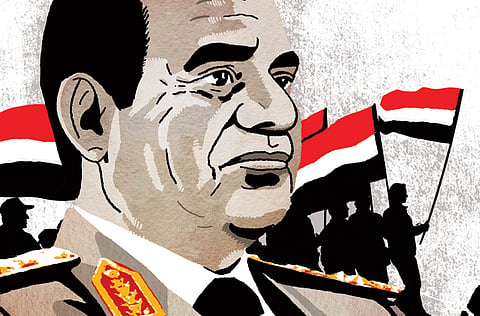Al Sissi has his task cut out
In Al Sissi’s view, the page of the Muslim Brotherhood has been turned forever

For the first time in more than three years, there is a sense of cautious optimism in Egypt, following the swearing-in of Abdul Fattah Al Sissi on Sunday amid much pomp and ceremony. The former defence minister is considered a national hero by most Egyptians — the man who had rid the country of the despicable rule of the Muslim Brotherhood and responded to the pleas of millions who took to Egypt’s streets and squares on June 30, 2013. This is the pervasive view that is trumpeted by the media and most of Egypt’s intellectuals.
More than 23 million Egyptians have voted for Al Sissi, who received almost 97 per cent of the total votes polled in last month’s presidential elections. It was a landslide victory, reminiscent of the days when former president Hosni Mubarak used to run for re-election. But this time, it was a fair and free poll, with minimum official interference. Even Al Sissi’s competitor, veteran politician and leftist candidate Hamdeen Sabahi, acknowledged defeat. The vote was the penultimate step in the road map for the future, which Al Sissi himself outlined on July 3 last year, when he ousted the country’s first freely elected president Mohammad Mursi.
The West, especially the US, was critical of the July upheaval, but stopped short of calling it a coup. Few could afford to cut off relations with Egypt altogether. The bloody crackdown against Islamist demonstrators at Rabaa Al Adawiya square last August had polarised Egyptian society. It was followed by terrorist attacks against the police and army by radical groups, which the government blamed on the Muslim Brotherhood. Soon, the movement was banned and most of its leaders were arrested and put on trial, including the deposed Mursi. Egypt had sunk into chaos with the army sending troops into northern Sinai to fight jihadists who had declared war on the state. The Muslim Brotherhood and their allies took to the streets denouncing Mursi’s ouster and calling for restoration of legitimacy. The government responded with an iron fist and thousands, including few journalists, were arrested.
However, a growing number of Egyptians, who rejected the Islamist rule, began calling on General (later Field Marshal) Al Sissi to run for the country’s highest office. Eventually he yielded, resigning his post and announcing his candidacy. There was no doubt that he would be the favourite. Not only had he the support of millions of Egyptians, but also enjoyed the backing of influential countries like Saudi Arabia, the UAE, Kuwait, Jordan and Russia.
It was not what young demonstrators at Tahrir Square thought would happen when they launched the January 25, 2011, uprising that finally deposed Mubarak after more than 30 years of continuous rule. But many Egyptians wanted stability and security, two traits that went missing since the Islamists’ historic victory in the 2012 presidential elections. There is no doubt that Mursi and the Muslim Brotherhood behind him committed fatal mistakes and invited the wrath of the people. Mursi’s constitutional declaration in November 2012 was an unforgivable blunder, but it is also true that the so-called deep state in Egypt and the old guard made sure that his short-lived reign would be a total and utter failure.
Major challenges
Less than 50 per cent of eligible voters participated in last month’s polls and the vote was extended by a day to encourage people to turn out. The government threatened fines against vote dodgers. So, in spite of his landslide victory, Al Sissi would need to present himself as a leader for all Egyptians. He has to battle major challenges and his job will not be easy. He has made big promises to Egyptians, most of whom are impatient and weary. The economy will be the toughest challenge. But Saudi Arabia has already promised to stand by him and called for an international donors’ conference as soon as possible. Revving up the Egyptian economy will take time. It will require billions of dollars to kick-start the economy. In addition, Al Sissi will have to deal with the socio-economic pressures as Egyptians stage sit-ins and strikes demanding jobs and pay rises. Eventually, the new president will have to address national reconciliation and deal with human rights and freedom of expression — issues that matter to his western allies.
From Al Sissi’s perspective, the page of the Muslim Brotherhood has been turned forever, but sympathisers of the group exist and the new president will have to find a way to accommodate political Islam, such as the Salafists belonging to Al Nour Party, which has supported him. There is no doubt that a stable and prosperous Egypt will have a major influence on its Arab neighbours. Al Sissi has promised to restore Egypt’s leading regional role. This is something that his Gulf and other Arab allies expect and support. Egypt’s regional influence has been compromised in the past few years. While Al Sissi will certainly deliver a more vibrant Egypt, the question remains whether he will be able to meet Egyptians’ most basic aspirations: Food, freedom, social justice and human dignity.
Osama Al Sharif is a journalist and political commentator based in Amman.


